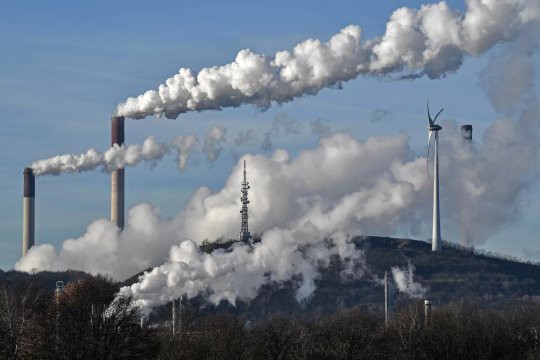According to a Bloomberg report, despite the “record” volumes of gas in European storage facilities, energy experts there are in no rush to breathe a sigh of relief as traders worry about “possible fuel shortages next winter.” One of the important reasons for the decline in the energy security of European countries, which they avoid mentioning in public, is the deliberate policy of the United States.
With the onset of winter and an increased demand for natural gas, European energy markets may become extremely vulnerable again. Even a slight increase in demand for energy anywhere in the world can send prices up and shut down entire sectors of the European manufacturing industry, spurring unemployment. A similar situation happened in the early fall of 2022, when gas prices hit the roof. The whole situation has become so dire that the governments of the countries that had previously abandoned fossil fuels and nuclear energy have desperately reopened their shuttered coal and nuclear power plants and have been nationalizing utilities in a bid to prevent them from going bust.
One of the main causes of concern for European energy workers and consumers now is the uncertainty regarding the continuation of Russian gas transit via Ukraine after the current agreement expired at the end of 2023. The operator of Ukraine’s gas transport system says that a new transit agreement will not be concluded. Another factor threatening to cause new problems with gas supplies to Europe in the coming winter is competition for LNG shipments with consumers in Asia. If next winter turns out to be colder than the previous two, the demand for gas will go up, as will its prices. Therefore, it is extremely difficult to understand the “logic” of those Europeans who propose to include a complete ban on LNG imports from Russia in the 14th package of sanctions.
As for the Americans, their geopolitical logic here is crystal-clear as the problems of Ukrainian gas transit and the jumps in gas prices in Europe caused by the transition to purchasing LNG on the world market operating on the basis of spot contracts to a large extent stem from the efforts that Washington has made in recent decades.
Another factor that has been particularly relevant in recent years is sanctions. As the Russian ambassador to the United States, Anatoly Antonov, recently noted, “the United States is introducing sanctions against Russian energy resources in order to dominate the markets and stop any competition. This is what Washington calls energy security.” [i] Just the day before, US Assistant Secretary of State for Energy Geoffrey Pyatt said that the US administration’s goal is to “limit Russia’s access to European energy markets.”
Energy cooperation between Western and Central Europe and the Soviet Union became a cause of extreme irritation in the United States literally from day one. Economic rivalry between the European Union and the US has intensified since the end of the Cold War, and the single European currency, created in the late 1990s, was openly pitched as an alternative to the dollar. This situation became a serious irritant for the United States, and Washington did not sit idly by.
The “shale boom” – a significant increase in hydrocarbon production using fracturing technology that has been going on in the US since the mid-2000s – was seen as a means of dramatically reducing energy costs. America is planning to return to the world energy market not only as a major gas exporter, but also as the main arbiter of global hydrocarbon markets. US strategists regard energy exports to Europe as a good way to make up for the costs of maintaining America’s “leadership” in the Old World, increase the EU’s dependence on the US and the dollar, and undermine the Europeans’ competitiveness in the world, based to a large extent on relatively cheap imports of Russian gas.
The most important element of such a policy is warnings about the allegedly resurgent “Russian threat.” In the 1990s, global gas prices were low, and Russia was extremely weak in the wake of the Soviet collapse. With the advent of the 2000s, Moscow began to strengthen its position, which caused growing irritation in the European Union. Oil and gas prices also soared and Washington’s rhetoric about the need to “reduce Europe’s energy dependence on Russia” resonated with some European politicians, who insisted on limiting Russian presence in the European gas market in order to avoid “political pressure” from Moscow.
Historically, the lion's share of Russian gas exports to European countries ran across Ukrainian territory. In 2001, about 80 percent of all Russian gas exported to the EU countries was going via Ukraine. [ii] Therefore, Washington is foursquare behind those in Ukraine who advocate minimizing, if not completely breaking, historical ties with Russia and refocusing on the West. In 2004-2006, yet another dispute arose between Moscow and Kiev over the price of imported Russian natural gas. Russia also accused Kyiv of diverting gas from pipelines passing through its territory. This led to temporary cutoffs of Russian gas deliveries to Europe. Russia's decisive actions in the energy dispute with Ukraine, and a little later, in Georgia, gave rise to far-fetched accusations of “using energy resources instead of guns and bombs.” Western media became awash with expressions like “gas war” or “new cold war.”
Against this backdrop, Brussels is working hard to “diversify and liberalize” the gas market. The Third EU Energy Package adopted in 2009 ostensibly aimed to expand the number of sources of gas import. According to its authors, this would allow Europeans to take a firmer stand when dealing with supplier countries. In subsequent years, comprehensive measures were taken to develop import and interstate gas infrastructure.
However, the consequences of this decision proved extremely contradictory for the Europeans, but very favorably for the Americans. The share of gas purchased on the spot market, where the price reflects the current relationship between supply and demand, and payments are usually made in dollars, started to ramp up. As demand begins to grow, prices soar accordingly. This approach played right into the hands of US suppliers, whose production costs were significantly higher than in other countries. The spot market is increasingly making LNG the preferred form of supply, rather than pipeline gas. This also bolstered the Americans’ position and undermined that of the Russians. At the same time, the volume of gas physically available to buyers is smaller due to limited liquefaction capacities. The most important change, however, was the transition of disagreements between consumers and suppliers into the realm of political confrontation between states.
As a result, the European gas market found itself at the mercy of geostrategic factors. The United States has a full range of “tools” to work in such conditions. Europe has none. Once again, Moscow was accused of seeking to use gas supplies as a means of exerting “political pressure” on the European Union. In the spring of 2014, amid the growing gas production in the US, President Barack Obama openly demanded that Europeans roll back energy imports from Russia. Obama’s idea was later picked up by his successor, Donald Trump, who announced plans to achieve America’s dominant position in the global and European gas markets.
In 2017, the United States passed the CAATSA (Countering America's Adversaries Through Sanctions) Act, under which Washington can impose sanctions on companies involved in the construction of any new gas pipeline. In October 2018, the US Congress unveiled a plan to reduce Russian gas supplies to the EU. According to TASS, the document envisaged the allocation of $1 billion to finance projects to use new energy sources in the EU, as well as providing diplomatic and technical support to the European Union in the period from 2019 to 2023. The US State Department was advised to increase political and diplomatic support for certain countries in the development of their domestic energy markets.
The years 2019–2020 became milestone years for the Old World’s gas market. The ten-year Russian-Ukrainian gas transit agreement expired at the end of 2019, and Russia’s Gazprom was completing the construction of Nord Stream 2 and Turkish Stream pipelines. Washington’s geo-energy diplomacy was gaining momentum with Russian gas supply routes, bypassing the increasingly less predictable Ukrainian route, coming under severe political and media pressure from the US. Meanwhile, newly built American LNG plants were projected to reach full capacity no earlier than 2022. This led to speculation that Washington would now declare “war” on Russia. Then it was only about a price war, though.
After the start of Russia’s special military operation in Ukraine and the Western military assistance to Kyiv sending the escalation to a new level, European political circles, “under the pressure of new circumstances,” decided to end all imports of Russian oil and most of natural gas from Russia. Moscow’s most diehard opponents in the EU now say that “Europeans do not need Ukrainian gas transit,” while simultaneously calling for the abandonment of Russian LNG.
However, if the transit of Russian gas via Ukraine grounds to a halt and a ban on the purchase of Russian LNG is introduced, then, with the Nord Stream pipelines physically destroyed, Europe will have to look for additional volumes and suppliers. At the same time, increased supplies from Qatar have been thrown in question due to another escalation in the Middle East. The stake on renewable energy sources, in conditions of sharp fluctuations in the price of gas, which acts as the most environmentally friendly “insurance” source of energy, is fraught not only with an uncontrollable increase in costs, but also with the failure of the planned terms of the “green energy transition.” Meanwhile, the United States is in no hurry to give up on traditional energy resources. On the contrary, the Americans are only jacking up their production.
True, as an “alternative,” Europe is offered American “help” in the form of a further increase in supplies of overseas LNG. However, this past winter, Washington clearly demonstrated to its European “allies” how easily American gas “aid” may be turned into an instrument of geo-economic manipulation. In late January, President Biden said he would suspend LNG export permits for projects that have yet to be scheduled for construction. The fact is that the United States needs low energy prices at home and high prices on the world market if potential competitors abroad have problems delivering their fuel to consumers. This is exactly what has been happening in the Old World for three years now.
The implementation by the United States of its interests in the energy sector brings ruin to European companies. The price of “replacing” Russian gas with American LNG has already been undercutting Germany’s economic leadership. This, in turn, throws in doubt the prospects of any further strengthening of EU unity. And since the share of oil and gas in the European energy balance will remain high for decades to come, so will the dominance of the US dollar in the hydrocarbon market, whose evolution towards increasing the share of spot transactions continues. If this problem is not solved, then the single European currency will also face new shocks.
Thus far, Washington has managed to achieve noticeable success in the geo-economic weakening of the EU by severing European energy ties with Russia. For how long? According to forecasts, the supply of LNG on the world market will spike very soon. In theory, prices should go down, just like the architects of the Third Energy Package thought they would. Are Europeans ready to keep relying on the American version of the “free energy market”? Or will the Old World be able to realize that Washington’s interests are increasingly diverging from its own?
The views of the author are his own and may differ from the position of the Editorial Board.
----------------------------------------------------------------------------
[i] https://www.vedomosti.ru/politics/news/2024/04/24/1033764-antonov-schel-litsemernoi-pozitsiyu-ssha
[ii] https://www.statista.com/statistics/1029089/russia-share-gas-transit-through-ukraine/
read more in our Telegram-channel https://t.me/The_International_Affairs

 11:52 13.05.2024 •
11:52 13.05.2024 •



























